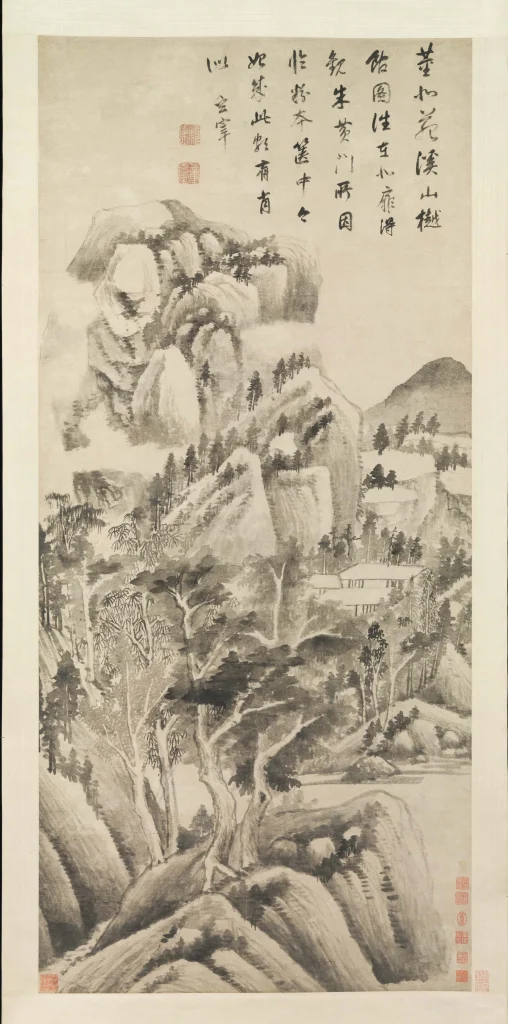Myths are sacred tales that explain the world and our experience within it. They contain our hopes, our dreams. Immortality is one dream, and giving up immortality the unanswered question in Li Shangyin’s poem, Jade Lake.

As our Mother of Jade Lake opens her beautiful window,
The Yellow Bamboo sounds its pitiful song.
If eight steeds can gallop to the ends of the earth,
King Mu, why did you never come back?
yáo chí ā mǔ qǐ chuāng kāi
huáng zhú gē shēng dòng dì āi
bā jùn rì xíng sān wàn lǐ
mù wáng hé shì bù chóng lái
瑤池阿母綺窗開
黃竹歌聲動地哀
八駿日行三萬里
穆王何事不重來
King Mu and the Queen Mother of the West
Stories of a goddess and a mortal falling in love are common in both Western and Eastern cultures. One of China’s most popular myth stories concerns the historical figure of King Mu of Zhou (穆王, mù wáng) and the mythical Queen Mother of the West (Xiwangmu, 西王母).
Depending on how one accounts for time, King Mu of the Zhou dynasty reigned from 976–922 BC or 956–918 BC. During his 55-year reign he conducted military campaigns of varying success in both the west and the east. He is said to have lived to the age of 105.
The original mythical tale of King Mu and Queen Mother was written around 296 BCE and rediscovered in 281 CE. Li Shangyin, retells the story poetically in four rhyming verses.
King Mu, wishing to achieve immortality, traveled by horse to visit the Queen Mother of the West. She lives by Jade Lake high in the mythical mountain of Kunlun. I her garden are the Immortal Pears. They have a love affair, and she passes on the secret of immortal life, but, as in James Hilton’s Shangri-La, the secret must remain on Mount Kunlun.
King Mu returns to his earthly kingdom and dies like any other mortal. But why, asks Li, does he never come back?

Xiwangmu 西王母
In Taoism, she is the goddess of life, fertility and immortality. Li Shangyin calls her 瑤池阿母, Yáochí ā mǔ, Our Mother at Jade Lake.
As the earth weeps
Li Shangyin (c. 813–858) lived in the declining years of the Tang dynasty when drought and famine were common occurances. While green bamboo is a symbol of prosperity, yellow bamboo is one of poverty. And yellow bamboo waving back and forth in the wind, would create a mournful song, like the wailing of the suffering peasants.
Wang Mu has eight horses (八, Bā, eight, because it sounds like Fá which means “prosperous” or “lucky”). In the original tale, King Wu is accompanied by seven attendants, making eight riders.
Notes on Translation
Blue Jade is a talisman of peace and serenity. Jade Lake. 瑤 Yáo, jade and 池 Chí, literally lake, sometimes translated as “pool.” Chí is a homophone with 氣, Chi, meaning life force.
三萬里 sān wàn lǐ. The translation is actually 30,000 li. I have used the more poetic 10,000 leagues, which is roughly similar. This is roughly equivalent to traveling around the earth’s circumference.
Today, most Chinese identify Tiānchí lake (天池, Heavenly Lake ), in Tianshan, Xinjiang region, as the Queen Mother’s Jade Lake. It is a UNESCO World Heritage Site and home to China’s Uyghur population. In Li Shangyin’s lifetime the Uyghur Khanate was extensive.
The Zhou dynasty (1050–771 BC) was significant for contributing Confucianism, Taoism and the written script that evolved into today’s recognized form.
瑶池
李商隐 〔唐代〕
瑶池阿母绮窗开,黄竹歌声动地哀。
八骏日行三万里,穆王何事不重来。
译文及注释
译文
瑶池上西王母的雕花窗户向东敞开,只听见《黄竹歌》声震动大地人心悲哀。
周穆王有八匹能日行三万里的骏马,为了何事违约不再来?
注释
瑶池阿母:《穆天子传》卷三:“天子宾于西王母,天子觞西王母于瑶池之上。西王母为天子谣曰:‘白云在天,山陵自出。道里悠远,山川间之。将子无死,尚能复来。’天子答之曰:‘予归东土,和治诸夏。万民平均,吾顾见汝。比及三年,将复而野。’”《武帝内传》称王母为“玄都阿母”。
黄竹歌声:《穆天子传》卷五:“日中大寒,北风雨雪,有冻人。天子作诗三章以哀民。”
八骏:传说周穆王有八匹骏马,可日行三万里。《列子》、《穆天子传》等记载不一。
穆王:西周人,姓姬名满,传说他曾周游天下。
此诗讽刺求仙之虚妄。首句写西王母倚窗伫望,候穆王而不至。次句借黄竹歌声暗示穆王已死。三四句则写西王母因穆王不来而心生疑问。斥神仙而以神仙(王母)的口气写出,句句对比,以见长生之虚妄,求仙之荒诞。《李义山诗集笺注》引程梦星曰:“此追叹武宗之崩也。武宗好仙,又好游猎,又宠王才人。此诗熔铸其事而出之,只用穆王一事,足概武宗三端。用思最深,措辞最巧。”
简析
《穆天子传》载: 周穆王西游至昆仑山,遇西王母,宴穆王于瑶池。临 别,西王母作歌: “将(望)子毋死,尚能复来。”穆王亦作歌回答,约定 三年后重来。又载穆王南游,遇大风雪,百姓受冻,曾作《黄竹之歌》 以哀 民。并传穆王有八匹骏马,日行3万里。晚唐好几个皇帝迷信神仙之道,服食丹药,妄求长生,以至服金丹中毒死去。本篇糅合上述传说加以生发,虚构出神仙西王母等候穆王重来而不见的场景,以讽刺皇帝求仙之虚妄。
这首诗就是根据西王母与周穆王相约见面的传说来构思的。作者抓住西王母希望穆王“复来”、穆王也许诺复来这一点,虚构了一个西王母盼望穆王归来的情节:西王母推开雕镂彩饰的窗户,眺望东方,却不见穆王的踪迹,只听见《黄竹歌》声哀动大地。首句是仙境的绮丽风光,次句是人间的凄楚情景,形成强烈的对比。
这个对比兼含着两层意思:一是隐喻作歌之人已死,唯其歌声徒留人间,仙境虽美,怎奈无缘得去,暗含着对求仙的讽刺;一是用《黄竹歌》诗意,暗示人民在挨饿受冻,而统治者却在追求长生不死,希图永远享受,寄寓着对统治者求仙的斥责。
诗的末两句是写西王母不见穆王而产生的心理活动:穆王所乘的八骏飞驰神速,一天能行三万里,如果要来,易如反掌,可是他为什么还没有如约前来呢?西王母盛情邀请穆王重来,穆王曾许诺重来,而且来也方便,乘上八骏瞬息就到,可是穆王却终究没有来,不言穆王已死而其死自明。然而,西王母却仍在开窗眺望殷切守候。这就表明西王母希望周穆王不死,可是这个希望终于落空了。即令仙人如西王母,也不能挽救周穆王于一死,则人间那些所谓长生不老之术,自然更是靠不住的了,不信求仙之虚妄而其虚妄自见。
从来讽刺求仙,多从神仙不可遇着眼。这首诗却透过一层,从即遇神仙 亦复何益这一点来构思立意。穆王遇仙,瑶池欢宴,按说可享长生之福了, 却终不免一死;不但如此,连神仙自己对“穆王何事不重来”竟也茫然无 知。如此神仙,如此求仙,岂非彻底虚妄!
纪昀评此诗说:“尽言尽意矣,而以诘问之词吞吐出之,故尽而未尽”(《李义山诗集辑评》)。正是由于末两句不作正面指斥,所以此诗于明白酣畅中又具含蓄蕴藉之致,读之觉余味无穷。叶燮称“李商隐七绝,寄托深而措辞婉,可空百代”(《原诗》)。
analysis
According to the Biography of the Son of Mu, King Mu of Zhou traveled west to Kunlun Mountain, met the Queen Mother of the West, and feasted King Mu in Yaochi. Before parting, the Queen Mother of the West sang, “I hope my son will not die, but still come back.” King Mu also answered in song, agreeing to come back three years later. He also carried King Mu to the south, where he encountered a heavy snow storm and the people were frozen. He once wrote the Song of Yellow Bamboo to mourn the people. It was also said that King Mu had eight horses, which traveled 30000 miles a day. In the late Tang Dynasty, several emperors believed in the way of immortals. They took pills in an attempt to live a long life, and even died of poisoning after taking gold pills. This chapter combines the above legends to create a scene where the fairy Queen Mother of the West was waiting for King Mu to return and disappeared, to satirize the emperor’s vanity of seeking immortality.
This poem was conceived according to the legend that the Queen Mother of the West met King Mu of Zhou. The author seized on the fact that the Queen Mother of the West hoped that King Mu would “come back” and that King Mu also promised to come back, and made up a story that the Queen Mother of the West hoped that King Mu would return: the Queen Mother of the West pushed open the carved and decorated window and looked to the east, but there was no trace of King Mu, and only heard the voice of “Yellow Bamboo Song” moving the earth. The first sentence is the beautiful scenery of the fairyland, and the second sentence is the sad scene of the world, forming a strong contrast.
This contrast also contains two meanings: first, it is a metaphor that the singer is dead, and only his singing voice remains in the world. Although the fairyland is beautiful, it is impossible to get away, implying a satire on the quest for immortality; The first is to use the poetic flavor of the “Yellow Bamboo Song” to suggest that the people are starving and suffering from cold, while the rulers are pursuing immortality, hoping to enjoy it forever, implying a reprimand for the rulers’ pursuit of immortality.
The last two sentences of the poem are about the psychological activities of the Queen Mother of the West when she did not see King Mu: the eight steeds that King Mu rode were flying at a high speed, and could travel 30000 miles a day. If he wanted to come, it would be as easy as a palm, but why didn’t he come as promised? The Queen Mother of the West kindly invited King Mu to come again. King Mu promised to come again, and it was convenient for him to come. He arrived in a moment after riding the eight steeds, but King Mu did not come after all, not to mention that King Mu was dead and his death was self-evident. However, the Queen Mother of the West was still waiting eagerly by opening the window. This shows that the Queen Mother of the West hoped that King Mu of Zhou would not die, but this hope finally failed. Even if the immortals were like the Queen Mother of the West, they could not save King Mu from his death, then the so-called immortality techniques in the world would be even more unreliable. They did not believe in the vanity of seeking immortality, but saw themselves in vain.
He always satirizes and seeks immortals. This poem, on the other hand, is designed from the perspective of why it is beneficial to meet immortals. When King Mu meets an immortal, Yaochi feasts. He is supposed to enjoy the blessing of longevity, but he will inevitably die; Not only that, but even the immortals themselves were at a loss and ignorant of “Why does King Mu not come back again?”. Such an immortal, such a quest for immortals, is not completely false!
Ji Yun commented on the poem, saying, “The words are all about meaning, but the words are all about interrogation, so they are all about meaning” (Li Yishan’s Commentary on Poetry Collections). It is precisely because the last two sentences do not give a positive rebuke, so this poem is implicit and implicit in the clear and hearty, and it has a lasting aftertaste. Ye Xie said that “Li Shangyin’s seven unique poems are deep and tactfully worded, which can be empty for hundreds of generations” (The Original Poem).











